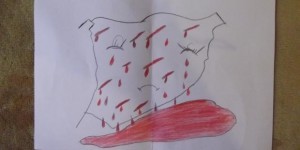Faking Reality in Damascus

By Ward al-Assi
In late August, I was on my way back from a friend’s house in al-Rabwah when I passed by the Tishrin Park, the largest in Damascus.

Despite the noise of heavy machine gun fire and the thunder of war planes, there was a film shoot going on in the park. Out of curiosity, I stopped to take a look.
There were lively female dancers in beautiful dresses. The film director and his assistant had their eyes fixed on a monitor to adjust the final shots of the scene.
Only a few metres away, there were families sitting on the grass, with their food and simple belongings around them. These people had fled from Aleppo, and were watching how a film is made, probably for the first time in their lives.
There were park wardens and men selling flowers and tea wandering around – almost certainly undercover security agents keeping an eye on the crowd.
Despite the sound of explosions and gunfire that carried all the way from the countryside around Damascus as well as from certain quarters of the city itself, the children of these displaced families were playing games. They played quietly, as the film director had asked them not to disturb the shoot.
A member of the film crew noticed that one of the children could not move his left arm. It seemed to be paralysed. He went up to him and asked what was wrong with the arm and whether it hurt.
“I broke it two days ago,” the boy said. “It hurt at first, but my mum told me I was a hero and I shouldn’t feel any pain.”
Surprised, the crew member told the boy he should get a plaster cast put on it.
“We don’t have the money to go to hospital,” the boy said.
A woman in her fifties overheard this conversation and asked the boy’s parents if she could take him to hospital. They agreed without hesitation.
As the filming continued, the dancers moved to the rhythm of loud music. While everyone was watching and enjoying the show, a little girl came up to me and asked, “What’s that big house on the mountain?” I was too ashamed to tell her that it was the People’s Palace, the residence of President Bashar al-Assad, located at the top of Mount Qassioun.
Perhaps Assad was looking down at us and thinking that everyone was in the park for recreation, not because they were displaced. Those people have no palace, just the sky and a little piece of land.
Almost an hour went by; I was distracted by the film shoot. The clothes and accessories had been chosen with great care to produce a flashy effect. Make-up artists were busy fixing up the actors’ and dancers’ faces, while other crew members counted the number of footsteps the dancers took.
For a moment, I thought I must be at a festival in some foreign city, with the noise of fireworks instead of explosions, the sad displaced families replaced by happy crowds, and clowns instead of security officers.
However, at the same time the film crew was setting up here, residents of Kafar Sousah just a few kilometers away were preparing for the funeral of people killed by shelling. In Darayya, again not too far from where we were, one could still smell the blood left by the massacre there.
My contemplation was interrupted when the child with the broken arm came back. He looked very happy with his new plaster cast.
One of the dancers grabbed a pen and wrote on it, “Get well soon.”
As more and more writing covered the cast, the child’s smile grew bigger. One guy drew a cloud and the sun, while a girl drew a bicycle. Then the boy’s sister drew what looked like big cubes and said, “That’s the Citadel of Aleppo.”
The little kid came up to me and handed me the pen. I stood there not knowing what to do. The park guards were watching to see what I would write. The boy saved me by asking me to draw a camera for him, pointing at the film crew. So I drew something that looked roughly like a camera.
After half an hour, the cast on the child’s arm was covered with writing and drawings. It took away all the attention the film shoot had been getting, and it showed up what a phony the director was. That child’s plaster cast was definitely a better reflection of reality than the film.
